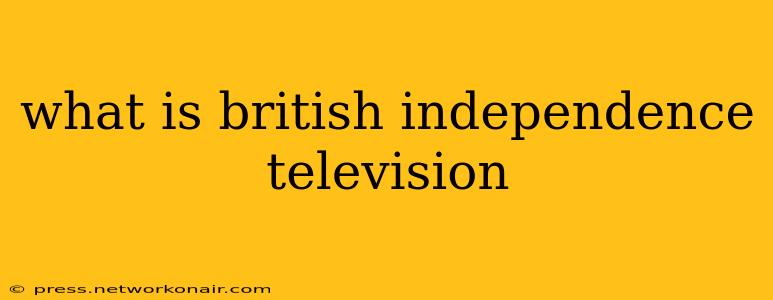British Independent Television, or ITV, is the largest commercial broadcaster in the United Kingdom. It's not a single channel, but rather a network of channels and production companies, making it a significantly complex entity in the British media landscape. Understanding ITV requires looking at its history, its current structure, and its role in shaping British television.
A Brief History: From Independent Television Authority to ITV plc
ITV's origins lie in the 1950s, a time when the BBC held a monopoly on television broadcasting in the UK. The Television Act of 1954 established the Independent Television Authority (ITA), which was tasked with licensing commercial television services. This marked the beginning of independent television broadcasting in Britain, a crucial step in diversifying the media landscape and fostering competition. Initially, broadcasting was franchised to regional companies, creating a network of independent stations.
Over the years, these regional companies consolidated and evolved, ultimately leading to the formation of ITV plc, a publicly traded company that now owns and operates a multitude of channels. This transition reflected the changing media landscape, moving from a regionally focused model to a nationally and internationally competitive one.
ITV's Current Structure: More Than Just One Channel
Today, ITV is far more than just a single channel. It's a media powerhouse encompassing:
- ITV Network: The flagship channel, showing a variety of programs including dramas, news, reality shows, and more.
- ITV2, ITV3, ITV4, ITVBe: These are sister channels offering a diverse range of programming, targeting different demographics.
- ITV Studios: This is a global production company, creating programs not only for ITV's own channels but also for other broadcasters worldwide. This allows ITV to generate revenue not just through advertising but also through the sale of its programming internationally.
- ITV Hub: This is the on-demand streaming service associated with the ITV network, allowing viewers to catch up on missed shows and access a library of content.
What Makes ITV Unique?
ITV's significance stems from several key factors:
- Commercial Broadcasting: Unlike the BBC, which is publicly funded through a license fee, ITV is commercially funded through advertising revenue. This influences its programming choices, often prioritizing popular formats that attract large audiences.
- Regional Variation (Historically): While the regional variations are less pronounced today than in its early years, ITV's origins in regional franchises left a mark on its programming and still informs certain aspects of its identity.
- Diverse Programming: ITV's channels offer a wide variety of programming, catering to a broad audience base. This ranges from popular reality shows to critically acclaimed dramas and news broadcasts.
- Global Reach: Through ITV Studios, the company has a significant international presence, producing and distributing content across the globe.
Frequently Asked Questions (PAA):
What are some of ITV's most popular shows?
ITV has a long history of producing successful and enduring television shows. Some popular examples include Coronation Street, one of the world's longest-running television soap operas; Love Island, a reality dating competition; and various popular dramas and crime procedurals that vary over time. The popularity of specific programs is subject to ongoing changes in audience preferences and trends.
Is ITV free to watch?
ITV's main channels are free-to-air, meaning they are accessible without a subscription. However, access to some content on the ITV Hub streaming service may require a subscription or account registration.
How does ITV make money?
ITV's primary source of revenue is advertising. Advertisements are aired during commercial breaks within their programming schedule. They also generate revenue through their production arm, ITV Studios, by selling programs to other broadcasters.
How does ITV compare to the BBC?
ITV and the BBC are the two dominant players in the UK television market, but they differ significantly in their funding models and programming philosophies. The BBC is publicly funded, while ITV is commercially funded. This difference leads to variations in program scheduling and content strategy. The BBC often prioritizes public service broadcasting, while ITV's focus is on attracting large audiences for commercial gain.
In conclusion, ITV is a multifaceted and influential force in the British and global television industry. Its history, current structure, and programming continue to shape the viewing habits of millions.

